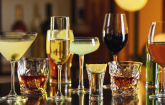
Seven Challenges to Big Alcohol's Power in 2014
An Invitation to Join the Fight with Alcohol Justice from Bruce Lee Livingston, Executive Director/CEO
SAN RAFAEL, Calif., Jan. 2, 2014 /PRNewswire-USNewswire/ -- Big Alcohol profits megabucks from a lack of transparency. Big Alcohol is a term for the most powerful alcohol corporations of the world, increasingly merging into a concentrated few. Most Americans have little idea of the true size and scope of the global businesses behind the brand names, let alone the way their practices endanger public health and safety.
(Logo: http://photos.prnewswire.com/prnh/20110727/DC41105LOGO)
Globally, alcohol consumption causes an estimated 2.5 million deaths every year. It is the most harmful drug to both drinkers and nondrinkers. Alcohol is the third leading cause of preventable death in the United States, accounting for an estimated 80,000 deaths annually. More than 4,700 people under age 21 die annually from injuries caused by drinking alcohol. Alcohol use is associated with physical and sexual assault, unintended pregnancy, sexually transmitted diseases, violence, vandalism, crime, overdose, other substance use, and high-risk behavior.
Yet global players like Anheuser-Busch InBev, SABMiller and Molson Coors, (operating as MillerCoors in the U.S.), Diageo, Pernod Ricard, and Constellation Brands inflict more than $223.5 billion dollars of alcohol-related harm annually in the U.S. with virtually no accountability for their actions. Wall Street is seriously chatting up the idea of a $100 billion merger of A-B InBev with MillerCoors to control about 75% of all beer sales in America. Alcohol producers and their trade association/front groups including DISCUS, Wine Institute, and American Beverage Institute use aggressive lobbying practices to kill or roll back alcohol regulations, proliferate youth-enticing marketing, and, of course, push a drug that hurts or kills many with immediate, chronic, and/or addictive results.
Amidst the harm, Alcohol Justice envisions healthy communities free of the alcohol industry's negative impact. We promote evidence-based public health policies and organize campaigns with diverse communities and youth against the alcohol industry's harmful practices. Characterizing these efforts as David vs. Goliath would be accurate indeed. That is why you are needed: to mobilize and to limit the impact of Big Alcohol on the next generation. That's why we commit at this time to a new year of ongoing campaigns to reduce Big Alcohol's negative influence. In 2014 we'll be inviting the public to challenge the power of these global alcohol corporate titans in seven crucial ways:
1) Tell your Senators, Representatives, and the Obama administration to stop Fast Tracking the Trans-Pacific Partnership free trade agreement. The process lacks transparency, and the TPP could undermine critical public health and safety regulatory controls of alcohol in the United States and worldwide.
2) Tell your local transit agencies and state legislatures to ban alcohol ads on public property. More exposure to alcohol ads influences youth to start drinking earlier, to drink more, and leads to more alcohol-related problems later in life.
3) Tell your state legislature to reduce the illegal blood alcohol content level from .08 to .05 BAC. Most of the rest of the world has adopted this standard to prevent DUI deaths and injuries. It's time the United States does too: .05 SAVES LIVES.
4) Tell the NFL, NBA, MLB, and all other professional and amateur sports associations worldwide to end alcohol branding, sponsorship, ads, and celebrity endorsements. Alcohol and sports are a toxic mix for athletes and young viewers alike, fueling injuries, violent behavior, and other alcohol-related harm.
5) Tell your state legislature to raise the alcohol excise tax and index it to the annual cost of living. Alcohol lobbyists have prevented state alcohol tax increases for generations, resulting in billions of dollars of lost revenue annually and a virtual state subsidization of alcohol-related harm.
6) Tell your social networks to ban all alcohol-related ads, tweets, and posts. Ineffective age-gating and voracious, profit-driven alcohol advertisers are drowning youth in seductive, harmful alcohol ads and other branded content.
7) Tell local businesses to take youth-oriented alcopops off the shelves because your community is an Alcopop-Free Zone®. Four Loko, Joose, Mike's Hard Lemonade, Smirnoff Ice and Bud Light Lime-a-Rita are just a few examples of cheap "cocktails on training wheels" that Big Alcohol uses to lure youth drinkers into trouble. Alcopops are the flavored malt beverages and flavored beers that Big Alcohol pushes to hook a younger generation on alcohol.
Alcohol Justice is not against alcohol consumption, but we strongly oppose the well-funded, deceptive advertising of the alcohol industry to promote harmful consumption, alcohol use at an early age, cheap products, and unlimited bar and retail access. You can help hold Big Alcohol accountable by challenging its power in these seven ways.
Just as there are bans on tobacco ads and effective sales restrictions, there can be stronger controls on alcohol advertising and sales to reduce the enormous public health and safety harm, and cost of that harm. Alcohol Justice invites you to join a renewed public effort to reign in Big Alcohol. Sign up for the Alcohol Justice eNews, and click through to Take Action. That's a great first step. Big Alcohol may have the power to advertise in every media, at every sporting event, and to every age, but the public does not have to sit back and take it. Please join the fight against Big Alcohol in 2014.
Bruce Lee Livingston, MPA
Executive Director/ CEO, Alcohol Justice
San Rafael, California
Contact: Michael J. Scippa 415 548-0492
Jorge Castillo 213 840-3336
SOURCE Alcohol Justice






Share this article